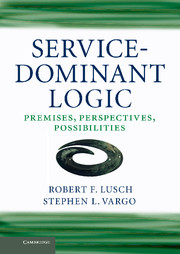Book contents
- Frontmatter
- Dedication
- Contents
- List of Exhibits
- Foreword
- Preface
- Acknowledgments
- Part I Premises
- 1 The service-dominant mindset
- 2 Roots and heritage
- 3 Axioms and foundational premises
- 4 Service as a guiding framework
- Part II Perspectives
- Part III Possibilities
- Appendix Reflection and dialogue
- Index
- References
4 - Service as a guiding framework
Published online by Cambridge University Press: 05 June 2014
- Frontmatter
- Dedication
- Contents
- List of Exhibits
- Foreword
- Preface
- Acknowledgments
- Part I Premises
- 1 The service-dominant mindset
- 2 Roots and heritage
- 3 Axioms and foundational premises
- 4 Service as a guiding framework
- Part II Perspectives
- Part III Possibilities
- Appendix Reflection and dialogue
- Index
- References
Summary
Customers do not buy goods or services: they buy offerings which render services which create value … The traditional division between goods and services is long outdated. It is not a matter of redefining services and seeing them from a customer perspective; activities render services, things render services. The shift in focus to services is a shift from the means and the producer perspective to the utilization and the customer perspective.
Evert Gummesson (1995)Introduction
On learning about service-dominant (S-D) logic, some observers say that they agree with its axioms and foundational premises but ask the more fundamental question, “Why ‘service’”? That is, they ask whether “service” is the proper designation for and characterization of this “new dominant logic.” At times, the question has been explicit and, at others, implicit.
This question of “Why ‘service’?” is a potentially critical issue, one that addresses the essential subject matter of markets and marketing and the purpose of business. On a broader level, it also deals with the fundamental nature of human interaction, on which society, markets, and business and marketing practices are built. Language is a form of joint action between actors that helps them coordinate thoughts and meaning and actions. In short, actions are at least partly driven by words and their (shared) meanings. Therefore, how service is conceptualized and the shared meanings we develop around the concept of “service” are crucial to S-D logic and its development and impact.
- Type
- Chapter
- Information
- Service-Dominant LogicPremises, Perspectives, Possibilities, pp. 83 - 98Publisher: Cambridge University PressPrint publication year: 2014

